- Learning time
- 30 minutes
- First play time
- 90 minutes
Planet Unknown
Designed by: Adam Rehberg,Ryan Lambert
In Planet Unknown players each terraform their own planet, building it out of polyomino (tetris-style) tiles that must fit onto the grid of their board: your first tile is placed at the edge of your board, and each subsequent tile must connect to a previous one. As you expand across the board, the tiles you choose represent the formation of your burgeoning planet: Civilisation, Water, Biomass, Rover and Tech. Each tile you place pushes a marker up two of the tracks (-see pictures above) on your Corporation board that record your progress on these five fronts. As you make your way up these tracks, the markers trigger bonuses, giving the game a feeling of escalation… when the game ends, it pays to have your planet as fully terraformed as possible: each column and row with no spaces scores points, up to a maximum of forty.
Let’s look at the five tracks individually. Moving up the civilisation track allows you to gather Civ cards, and choose one to keep. These might be some kind of instant reward, or game-end bonus. Each track also scores points – the game refers to them as medals – and whilst the water track has no bonuses, it offers the most medal rewards for climbing it (but be aware; you only push your water marker up the track when at least one part of the water tile is placed on the ice sections of your planet). The biomass track triggers extra tiles that can occupy a single space on the board: great for ‘patching’ in spaces in your planet you’ve either overlooked or been forced to skip. The tech track triggers special abilities – in the base game these are the same for each player, but there’s an advanced version where both planet boards and corporation boards are asymmetric. Then, there’s the Rover track, which requires a little more explanation.
The Rover track allows you to first add a Rover to your board, and then move it across the landscape; the purposes of which are twofold. One, your rovers can gather the six lifepods that start on your board, presumably housing the terraforming personnel, which are worth a point each. Two, they can also remove meteorites. These crop up on a lot of the tiles: when you add a tile with a meteorite symbol, you place a meteorite token on top. Three such tokens are worth a point when your rover scoops them up, but more importantly, any column or row in your planet with a meteorite in it at the end of the game does not score. So it’s important to keep them to a minimum wherever possible, and the rovers are a means of doing this.
Finally some tiles contain a ‘wild’ resource: energy. You can use energy to move up any track relating to the tiles the energy is adjacent to on your planet board, meaning it is extremely flexible depending on where and when you place it.
We’ve thus far overlooked one of Planet Unknown’s key selling points, which is how tiles are selected. They come in six depots that make up a lazy susan that twirls around according to the choice of the starting player in each round. They can choose the depot they want – each depot offers two tiles, one large and one small – whilst everyone else must take a tile from the depot in front of them. As soon as a depot is empty, or any player doesn’t have room to place a tile in their depot, the game will end. Players score points for the filled rows and columns on their planet, the medals from their progress up the tracks, any civ cards they gathered with end-game scoring on them and finally the objective cards that you share and compete with along with your immediate neighbours: most civ tiles on the edge of your planet, say, or the fewest water resources overall.
The guru's verdict
-
Take That!
Take That!
Very little. The only time you can ever be stymied is when the depot in front of you contains tiles you don't really want - but even then they are usually productive in some small way, if only in covering the planet.
-
Fidget Factor!
Fidget Factor!
All turns are taken simultaneously, for better (speed!) and worse (no interaction).
-
Brain Burn!
Brain Burn!
All those bits look initially overwhelming, but the nub of the game is Add a tile; Move up two tracks. Then take any benefits the tracks provide. The objectives and civ cards provide long-term strategic options, but the round-by-round feel of the game is fairly tactical: what, from my two choices, work best for me?
-
Again Again!
Again Again!
There's a bunch of variety here: the lazy susan has variable set-up by rotating the inner ring; the civ cards and objective cards change from game to game; the planet and corporation boards can be flipped to the 'advanced' sides that have asymmetric abilities/restrictions.

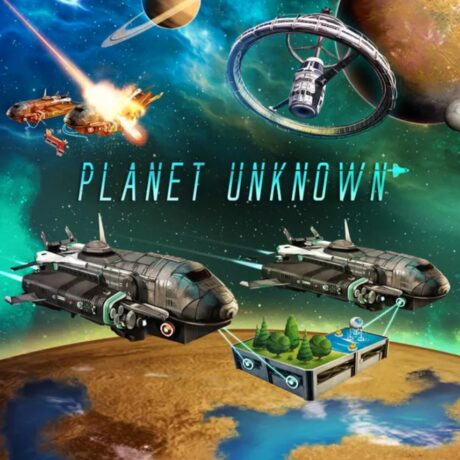
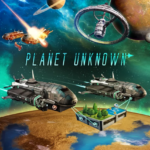
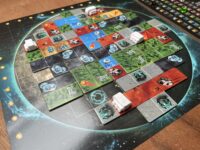
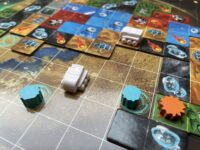
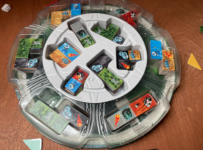
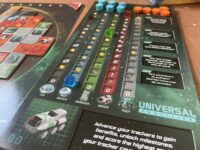
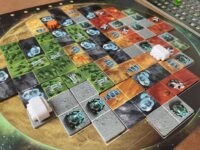


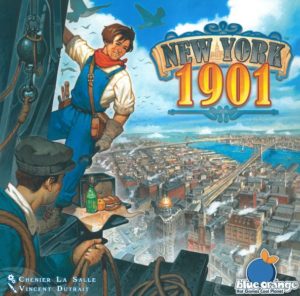
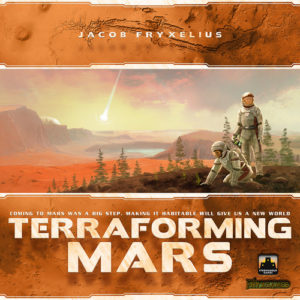
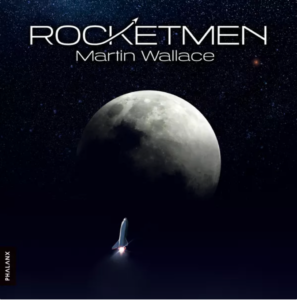
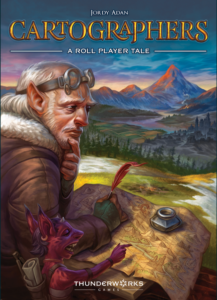
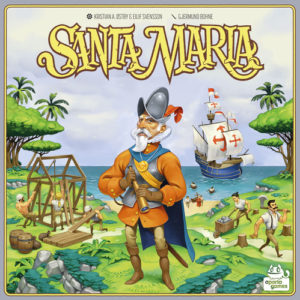
Sam says
Most of my time spent gaming I'll want more interaction than Planet Unknown offers, which is next to none. I like games where you mess with each others' plans and there is derision, indignance, outrage, laughter, and/or a sense of story. Here we are mostly busy with our own little boards, puzzling over the spatial challenge of these tiles and trying to wring the juice from the tracks, which are speckled with 'synergy boosts' that allow another free movement up any track at all. I'm not convinced that the theme totally stays the course: certainly by the end, you're mostly focused on what shapes will fit rather than pondering the lifestyle choices of the new inhabitants. But all that said, there is something deeply satisfying about this puzzle, and the huge amount of variety that is built into it: turns are taken simultaneously, there are no 'bad' options (until you run out of space!) just good or merely satisfactory ones. Planet Unknown offers a palpable sense of progress, and the miniature game-within-a-game of those rovers scurrying around trying to remove meteors from your cosmic plans is also rather fun in itself. How you feel about Planet Unknown, however, may come back to my opening sentence above: for gamers who want a boisterous affair, this isn't it. But Planet Unknown does that other type of game so well; that building, growing, gathering momentum and seeing something come to fruition, it's going to give a lot of pleasure for the more peaceable amongst us.